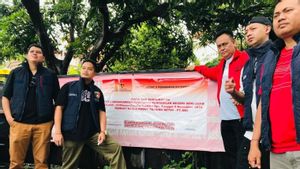JAKARTA - The Indonesian House of Representatives provides many notes regarding the service and education system in Indonesia that leaves many problems as a red report card at the end of the term of office of Minister of Education and Culture Nadiem Makarim. The DPR is obliged because it has a supervisory function.
"With so many notes given by members of the DPR regarding Indonesia's national education services, this shows that there is a red report card for the Minister of Education and Culture. Of course this is a challenge for our education system," said Fisip Lecturer, Andalas University (Unand) Ilham Aldelano Azre, Wednesday (9/10/2024).
Various issues highlighted by the DPR are related to the inequality of the quality of education, the welfare of teachers, the shortage of educators and the problem of honorary teachers, the process of accepting New Student Participants (PPDB), which every year causes problems, to minimal educational facilities or infrastructure in the regions, as well as violence and bullying that are rife in schools.
Not to mention the 2023 education budget that is not absorbed amidst the lack of educational infrastructure in the regions and the problem of the complicated teacher certification process, thus adding to the inequality factor in the quality of education in the country. Azre said that the criticisms submitted by the DPR should receive attention from the Government.
"The DPR has played its supervisory function well. Including how the DPR also provides support through budgeting and legislative functions. Of course this must be appreciated," he explained.
"But if it turns out that there are still many problems in our education system, it means that the government as the implementer of the program is still incompetent because it does not pay attention to immediately present solutions," added Azre.
Not long ago, criticism of a member of the DPR who had just been inaugurated was Dr. Gamal Albinsaid, M. Biomed regarding Indonesian education has drawn many public responses. Gamal himself is a doctor, a health innovator, a social entrepreneur, who is also a well-known inspiration.
Gamal said that education in Indonesia is in the critical category by explaining several indicators. As can be seen from the low results of Indonesia's achievements in the PISA (Program for International Student Assessment) program. Indonesia is ranked 69 out of 81 countries with a reading, math, and science score that is far below the set target.
SEE ALSO:
Not only that, dr. Gamal also highlighted the literacy and numeracy crisis in Indonesia, as well as unemployment for vocational school graduates to a low level of teacher welfare. Recent reports show that most teachers in Indonesia, including honorary teachers, receive income below 2 million rupiahs. This has a negative impact on the motivation and quality of teaching.
Azre agreed with dr. Gamal and assessed that the low problem of teacher welfare is still a scourge that threatens the quality of Indonesian education.
"The reality is that there are still many problems faced by teachers in Indonesia, ranging from salaries that are far from feasible to complicated and slow certification processes," he said.
Azre then mentioned one example of teacher welfare inequality that was conveyed by Member of Commission X DPR RI, Andreas Hugo. Andreas had highlighted the salaries of teachers in Ende Regency, East Nusa Tenggara, which was only IDR 250 thousand.
The problem of teacher welfare in remote areas has actually become common knowledge, which is still common. They often face tough challenges, such as walking for hours through steep terrain just to teach with very minimal facilities.
"Ironically, teachers in the 3T area (frontier, outermost, and underdeveloped), who should get more attention because of the educational challenges they face, are often ignored in terms of facilities and welfare. The salary received is not even enough to meet their basic needs," said Azre.
"This certainly has an impact on the quality of the teaching and learning process in these areas," continued the Lecturer of Public Administration.
Azre said that the DPR's view of teachers as the spearhead of education should be responded to by improvements. He said that the welfare of the teaching profession must be considered considering its duty to help efforts to educate the nation's life in accordance with the mandate of the 1945 Constitution.
"In addition to welfare issues, teacher certification is another issue that complicates the situation. Teacher certification, which should be a tool to improve quality and professionalism, actually gets into convoluted bureaucratic problems," said Azre.
"To get certification, teachers are required to pass the Teacher Professional Education (PPG) pretest, but this process is often hampered by inefficient systems and bureaucracy," he added.
According to Azre, this situation is very ironic considering the regulations that have been regulated in the National Education System Law which guarantees quota and capacity for teacher professional education.
"This shows that the teacher certification process is much more complicated than lecturer certification, so many teachers feel frustrated," said Azre.
The Director of the Indonesian Political Spectrum Survey Institute also highlighted the statement by the Deputy Speaker of the Indonesian House of Representatives, Cucun Ahmad Syamsurijal, about Indonesia, which is still a teacher emergency. Azre also underlined Cucun's criticism regarding the Government budget which should be more likely to be used to improve the education sector than for things that are not yet a priority.
"The uneven distribution of teachers between urban and rural areas, as well as the slow process of certification, add to the long list of problems that need to be resolved," he said.
The number of problems in the world of education is considered to be correctable as soon as possible. Including in terms of curriculum that is considered by many people not suitable to be implemented in Indonesia because the supporting facilities are not yet qualified.
"With the red report card received, Kemendikbudristek is faced with a big challenge to improve the education system in Indonesia," said Azre.
"Complete reform and concrete steps are needed so that the ideals of quality and equitable education throughout Indonesia can be achieved," he added.
The English, Chinese, Japanese, Arabic, and French versions are automatically generated by the AI. So there may still be inaccuracies in translating, please always see Indonesian as our main language. (system supported by DigitalSiber.id)

















